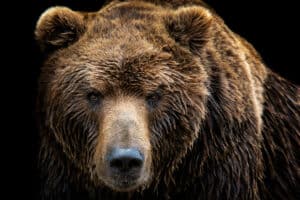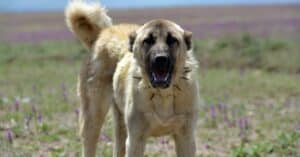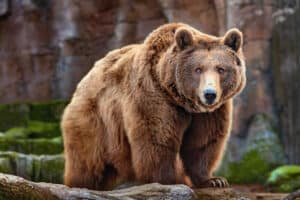Grizzly bears are incredible animals. They are 5 times stronger than humans, have a sense of smell that is 2100 times better than humans, and to top it off, they are super-fast. A grizzly bear can run at 35 miles per hour. It’s worth noting that the average human runs at 13 miles per hour while the fastest person alive, Usain Bolt, runs at a maximum speed of 27.8 miles per hour.
In addition, their knife-like claws can be as long as human fingers (4 inches). And, unlike many other animals, grizzly bears actually attack humans in aggressive rage. If you think they sound frightening, you’d be pleased to know that the early settlers in Oregon thought so too. In this article, you’ll learn about the extinction story of grizzly bears in Oregon.
When Did The Oregon Grizzly Bear Go Extinct?
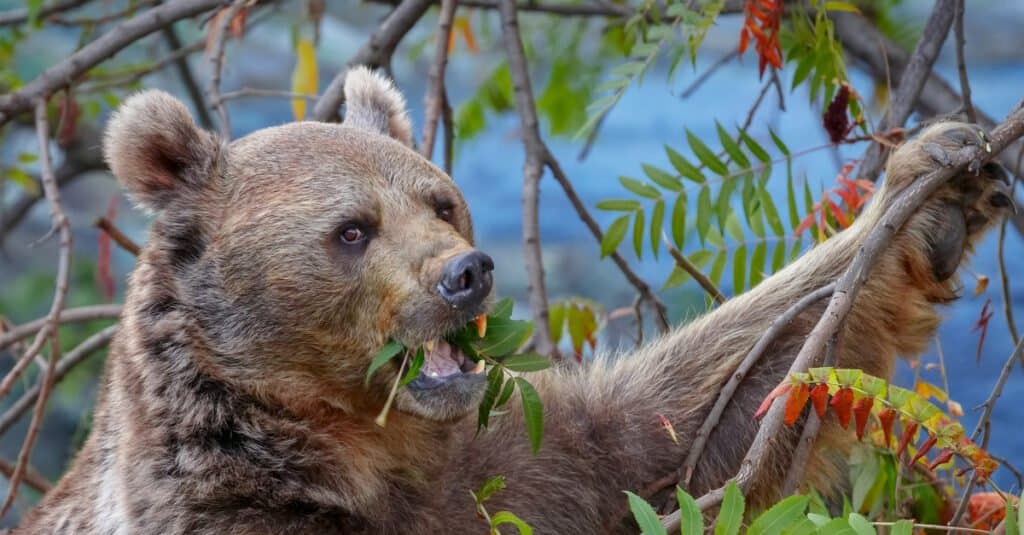
On September 14, 1931, grizzly bears went extinct in Oregon.
©ovbelov/Shutterstock.com
Grizzly bears in Oregon went extinct on September 14, 1931. The last ever seen grizzly bear species in Oregon was killed by a federal trapper. No other grizzly bears have been seen in Oregon since.
How Did The Oregon Grizzly Bear Go Extinct?
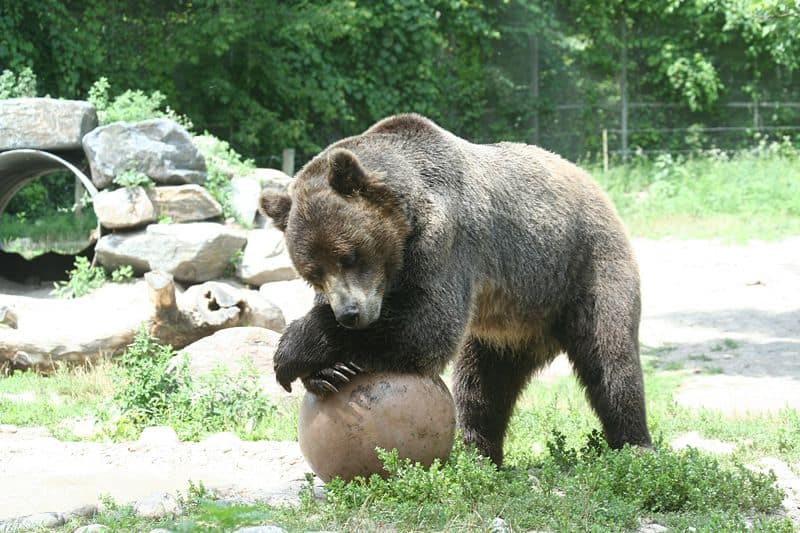
The Oregon grizzly bear was hunted into extinction by humans.
Like many other extinct species, the Oregon grizzly bear was hunted into extinction by humans. Sadly, unlike the California grizzly bear, very little was documented about the Oregon grizzly bear, so we are not certain of the exact population of grizzly bears in Oregon before people began to settle in the area. However, we can approximate that they were in the thousands.
Once settlers began to increase in population, they began taking more land from wildlife. Many animals fled to other locations, and many others died as humans began to destroy trees and forests. However, Oregon grizzly bears refused to leave the area, choosing to stand up to humans instead. Their super noses led them to human cattle, which they ate, and in many instances, bears attacked and killed humans.
Humans, in turn, began to fight back. Bear hunts, poisoned bait, and many more tactics were used to kill these large animals. People who killed bears were seen as strong and brave. But soon, humans discovered other less-noble causes to hunt bears; entertainment. Bears were captured and forced to fight other bears and even bulls. People watched these sports and even placed bets.
However, by the 1900s, their populations were apparently dwindling, and by 1931, a federal trapper shot and killed the last Oregon grizzly bear. It was rumored, however, that a pair of grizzlies lived in the Minam drainage west of the Wallowa Mountains between 1937 and 1938.
The Dangers of Extinction
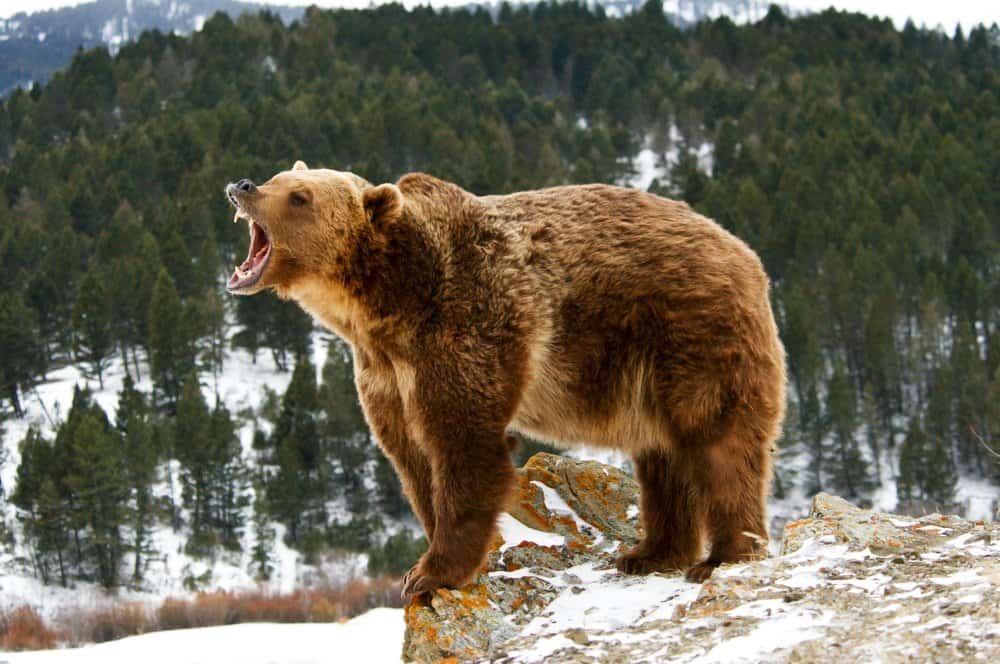
The extinction of animal species has economic effects.
©Scott E Read/Shutterstock.com
Humans and other animal species suffer when animals become extinct for many reasons. Since each species has a place on the food chain, extinction of any species means that another species has either lost a prey or a predator.
The extinction of animal species also has economic effects. Several animals, such as bees, which offer humans economic value (honey), are also going extinct. As their extinction progresses, the supply of the products we derive from them also reduces, making them more expensive.
The extinction of species also sets human development and progress back. It is no secret that many discoveries that aided modernization and inventions would be impossible or delayed without several animal species available for study. If species go extinct before modern scientists can study them, a lot of knowledge will be lost forever.
Another negative effect of extinction affects the entire world. The extinction of one species can lead to a lack of prey for another, which can also lead to that species dying out. As animal populations dwindle, so will the production of carbon dioxide. Without carbon dioxide, plants will slowly die out, leading to humans’ extinction.
How To Prevent Extinction of More Animal Species
Report invasive species: Invasive species also lead to extinction. When a species invades an area, it causes problems because the area may not have enough predators to keep its population in check. The invasive species will grow larger and unfairly compete with the native species for limited food. Sometimes, the native species lose and die out or go extinct.
Take responsibility for your pets: Pet trade is a major reason for invasive species, so it is important to take responsibility as a pet owner and keep your pets away from the wild if they are not native to the area. Many animals reproduce in large numbers, and some are asexual.
Don’t kill non-threatening species: Another way you can prevent extinction is by raising awareness about the killing of non-threatening species. If an animal isn’t threatening you, let it be.
Buy Eco-Friendly Products: Eco-friendly products are safe for the ecosystem and you. They do not have harmful components that can injure marine life or contain chemicals that can pollute our waters, amongst other things. It is also important to remember to reuse, reduce, and recycle.
Advocate for better meat laws: Not everyone can become vegan, but we can all do our parts by advocating for better laws guiding how animals are raised and what they can be killed for. Buying souvenirs made from endangered species directly supports the killing of these animals, so avoiding such animal products can prevent their extinction.
Black Bears of Oregon
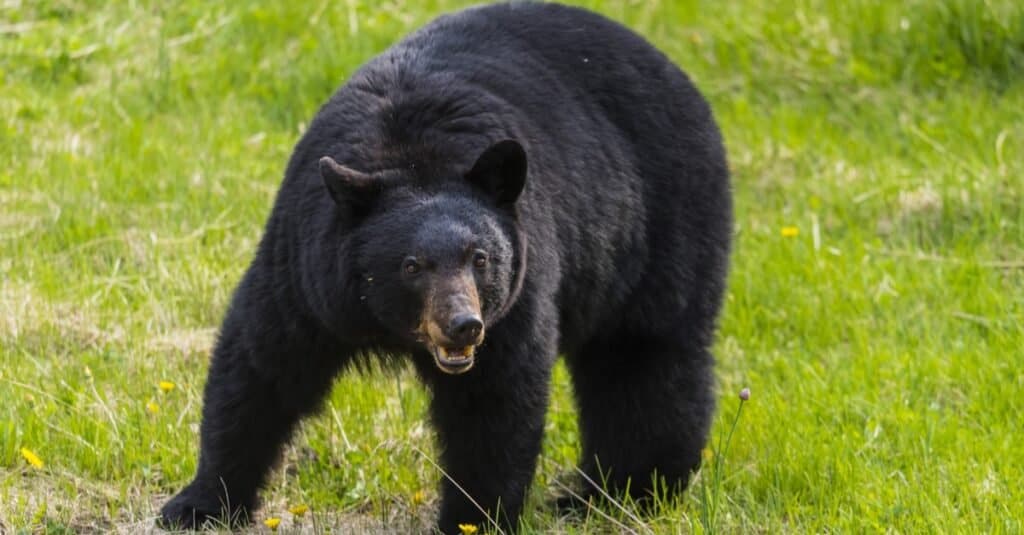
The only bear species left in Oregon are black bears.
©BGSmith/Shutterstock.com
Black bears are the only remaining species of bears in Oregon. There are about 25,000 to 30,000 black bears who live in forests that are far away from humans. However, if we do not learn from our past mistakes, they can also go extinct. Over the years, there have been multiple reports of grizzly bear sightings, but all of these have been unverifiable as investigated reports turned out to be black bears instead.
Black bears escaped the persecution grizzly bears suffered because of their nature. Unlike grizzly bears, known for their aggressive attitudes, black bears retreat and run away from humans. If you live in an area with large populations of any native species, realize that your location might be one of the only ones to have such species. Animals have as much right to the earth as we do, and treating them with respect and consideration will also benefit humans.
The photo featured at the top of this post is © Falade Adewale/Shutterstock.com
Thank you for reading! Have some feedback for us? Contact the AZ Animals editorial team.



